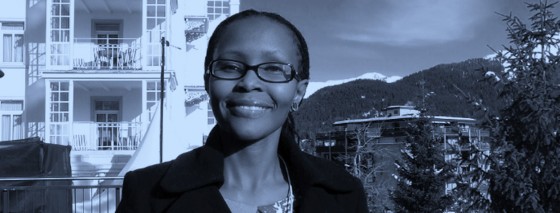Juliana Rotich – This is What I See! Crowedsourced Crisis Mapping in Real Time0
Posted In Media & Digital
Career: Executive Director Ushahidi, TED Senior Fellow, Blogger
Interests: Photography, Architecture, Mobile Sensors, African Futurism
Hometown: Eldoret, Kenya
Juliana Rotich is Co-Founder and Executive Director of Ushahidi, the crowdsourcing platform that leverages mobile phones and the internet to change the way information flows. Ushahidi is a web based reporting system that utilizes crowdsourced data to formulate visual map information of a crisis on a real-time basis. In the Kenyan scenario it was used to map out incidents of violence. Ushahidi then grew to be an open source platform that has been used in various situations such as the Haiti and Chile earthquakes, the Palestine conflict crisis, Japan’s Earthquake and the Lybian conflict.
Prior to Ushahidi Juliana has worked in the telecommunications industry for over ten years. She is originally from Kenya, with a Computer Science degree from the University of Missouri, Kansas City. She is a technology, budding African Futurist and TED Senior Fellow. She co- founded Mobisoko, a mobile marketplace for language and location relevant apps in Africa. She also writes the well-respected ‘Afromusing’ blog, typically with a focus on African tech and renewable energy. She often speaks at international conferences about technology, innovation, media, open source, crisis mapping and Africa; Past conferences she has spoken at include Lift, DEMO, TTI Vanguard, TransMediale, WSIS, DLD Women, Guardian Activate World Economic Forum -Davos, and ARS Electronica. She was named one of the Top 100 women by the Guardian newspaper and top 2 women in Technology 2011.
Ushahidi is a non-profit tech company that specializes in developing free & open source software for information collection, visualization & interactive mapping to democratizing information, increasing transparency & lowering the barriers for individuals to share their stories (Crowdmap, SwiftRiver). “Ushahidi” means “testimony” in Swahili, and was a website initially developed to map reports of violence in Kenya after the post-election fallout in 2008. Since then Ushaidi has grown to a focused organization and now consists of a strong team of volunteer developers primarily in Africa, but also Europe, South America and the U.S. It is a disruptive organization that is willing to take risks in the pursuit of changing the traditional way that information flows.
Crowdmap is designed and built by the people behind Ushahidi. As the Ushahidi platform has evolved, so have its uses. Crowdmap allows you to set up your own deployment of Ushahidi without having to install it on your own web server. It is the fastest, simplest installation of the Ushahidi platform. Within minutes you’ll be up and running with your own installation, mapping reports events and visualizing information.
SwiftRiver is a free open source platform that helps people make sense of information in a short amount of time. The platform was born out of the need to understand and act upon a wave of massive amounts of crisis data that tends to overwhelm in the first 24 hours of a disaster. In practice, SwiftRiver enables the filtering and verification of real-time data from channels such as Twitter, SMS, Email and RSS feeds. This free tool is especially useful for organizations that need to sort their data by authority and accuracy, as opposed to popularity. These organizations include media, emergency response groups, election monitors and more. This might include journalists and other media institutions, emergency response groups, election monitors and more.
Juliana´s TED Story: “I met two of the three co-founders of Ushahidi at TEDGlobal 2007, a conference that was a seminal moment for Africa, and for me. TED not only brought together online friends and kindred spirits, thereby seeding what later became Ushahidi, but it also changed my whole perspective about Africa, and the world. Since 2007, my life has taken an arc that I could not be happier about. I hosted the second annual TEDxNairobi, where the ideas worth spreading that TED lit in the TED Fellow’s minds, get passed on to others in the Kenyan community. As a TED Senior Fellow, I have had the incredible opportunity to make friends from around the world, and within the TED community, friendships that I treasure as we continue this journey of sharing knowledge and living our lives as active change agents in this world.”
More:
LinkedIn: Juliana
http://www.ted.com/fellows/view/id/31 (2011/03/16)
www.ushahidi.com
Twitter:@ushahidi
vimeo: Ushahidi
Facebook: Ushahidi
Crunchbase: Ushahidi
Wikipedia: Ushahidi
www.crowdmap.com
Twitter:@crowdmap
Facebook: Crowdmap
Swiftriver
Twitter:@swiftriver
Facebook: Swiftriver
www.afromusing.com
Twitter:@afromusing
Other articles/links/videos:
Japan:
Die Zeit: Ushahidi: Wissen, was wo in Japan passiert (2011/03/16)
GOOD: Earthquake in Japan: Help Google and Ushahidi Rescue Trapped Citizens and Reunite Families (2011/03/11)
Scienceray: Google and Ushahidi Serving Japan (2011/03/16)
Jonathan Stray: UN asks Ushahidi to produce Crisis Map of Lybia (2011/03/08)
Global Pulse: Crisismappers Extend UN Capacity in Lybia (2011/03/04)
Guardian.co.uk: Top 100 women: Technology – Juliana Rotich (2011/03/08)
Video: Interview Juliana Rotich on DLD (2011)
Global Voices: Japan: Earthquake Crisis Mapping on Ushahidi (2011/03/15)
Ushahidi: Crisis Mapping Japan´s Earthquake and How You Can Help (2011/03)
Geocommons: Japan Radiation Report Data Stream from Ushahidi (2011/03)
Davos: Ushahidi Grows Its Global Crowd-sourcing Platform, Slams Twitter Censorship (TCTV) (01/12)
Davos: Ushahidi Grows Its Global Crowd-sourcing Platform, Slams Twitter Censorship [TCTV]
Egypt:
Ushahidi: Crowdmapping Egypt (2011/01/25)
Diary of a Crisis Mapper: Ushahidi Egypt: When Open Data is Not so Open, or When People Just Don´t Get it (2010/11/20)
Ushahidi´s Juliana Rotich introduces Crisis Mapping in short:
Tweet



